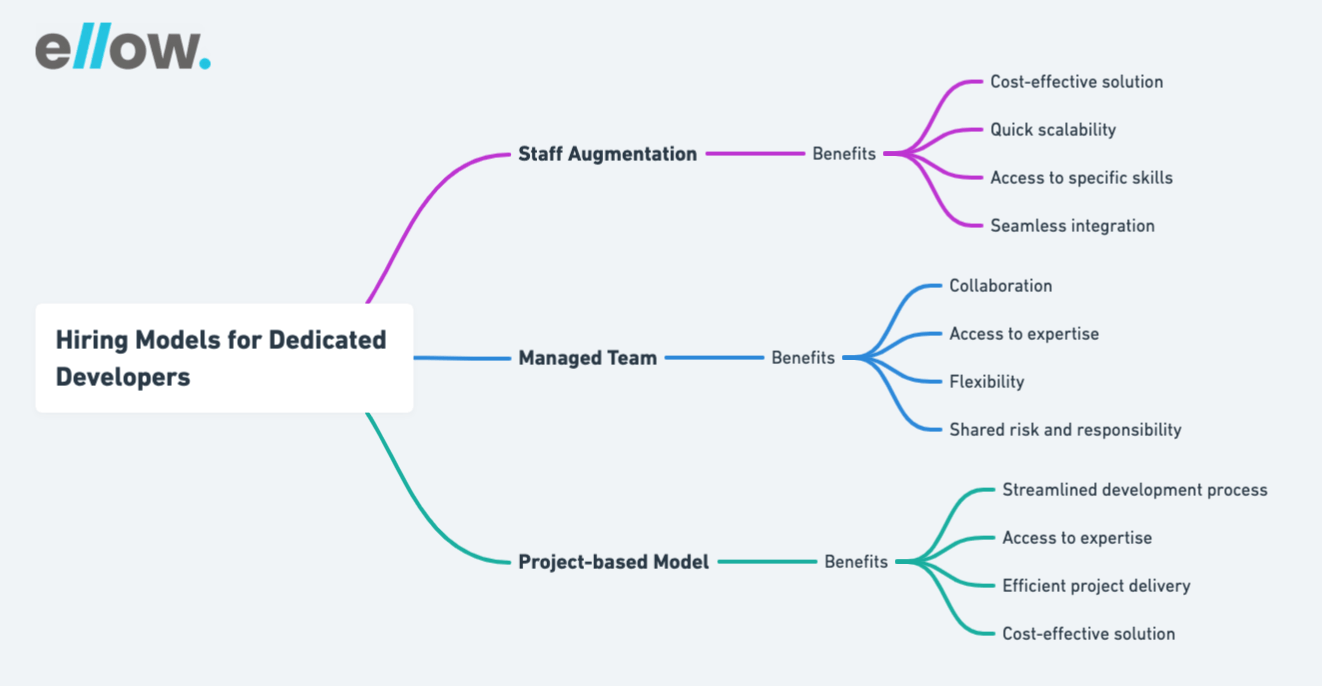Let’s build the future together.
Great ideas need great people. Partner with us to bring your vision to life, or take the first step in your career by joining our team of innovators.

In today’s rapidly evolving digital hiring landscape, an astounding 75% of companies report difficulty in finding skilled developers, according to a 2024 industry survey.
This talent scarcity not only hampers innovation but also poses a significant threat to growth in the tech sector. Amidst this backdrop, dedicated developers have emerged as a vital resource for businesses looking to stay competitive and innovative.
These specialized professionals offer the perfect blend of expertise, flexibility, and commitment, making them an ideal solution for projects requiring high-quality development skills.
This blog will guide you through the intricate process of hiring dedicated developers, ensuring you can navigate the challenges of the talent market and secure the best talent for your projects
Dedicated developers are specialized software professionals who are exclusively assigned to work on a client’s projects, acting as an extended part of the client’s in-house team, but typically operate from a remote location.
These developers are not just temporary hires; they are full-time, committed team members who focus solely on one client’s needs, ensuring that projects receive their undivided attention and expertise.
These developers bring expertise in various areas such as programming languages, frameworks, databases, and project management methodologies. They collaborate with clients to understand their needs and provide technical solutions that align with their objectives.
Roles within a dedicated development team may include software developers, project managers, business analysts, UI/UX designers, and QA engineers. Each member contributes their specialized skills to deliver a high-quality product within the specified timeframe.
By hiring dedicated developers, clients can avoid the challenges of recruiting and managing an in-house team. Instead, they can rely on a skilled and cohesive team that is dedicated to their project’s success.
Hiring dedicated developers can be a smart move for your company in several situations:
If your in-house team lacks certain skills for a project, hiring dedicated developers with expertise in those areas can help fill the gap. These developers bring specialized knowledge and experience, ensuring that your project receives the necessary expertise to meet its requirements effectively and efficiently.
When your team is overwhelmed with work, dedicated developers can step in to handle the extra workload efficiently. By hiring them, you can prevent delays and maintain project momentum without overburdening your existing staff. This ensures that deadlines are met and quality is maintained.
If your project’s scope is unclear or prone to change, dedicated developers provide flexibility. They adapt to evolving requirements, ensuring your project stays on track. This clarity prevents misunderstandings and allows for efficient collaboration, ultimately leading to successful project completion.
When your project’s details are unclear and subject to change, hiring dedicated developers can provide clarity and flexibility. They can help you navigate evolving requirements and ensure that your project stays on track despite uncertainties. This allows for smoother development and better adaptation to shifting project needs.
If your team struggles to keep up with new technologies, dedicated developers can help. They bring expertise to leverage the latest tools and trends, ensuring your project stays competitive. By hiring them, you can stay ahead in the rapidly evolving tech landscape without overwhelming your in-house team.
When you’re trying to get your product to market quickly, hiring dedicated developers can help speed up the development process. They can efficiently handle complex projects, meet tight deadlines, and ensure your product reaches customers faster, enhancing your company’s reputation and competitiveness.
If you have a tight budget, hiring dedicated developers can be a cost-effective solution. It saves money compared to maintaining an in-house team and avoids hefty recruitment expenses.
Plus, you can access skilled professionals without overspending, making it a wise financial choice for your company.
Hiring dedicated developers from regions with lower labor costs saves money compared to traditional hiring methods. By outsourcing, businesses can access skilled professionals at a lower cost. This cost-effectiveness allows companies to allocate resources more efficiently and invest in other areas of their business for growth.
Dedicated developers are highly skilled experts who can be specifically chosen to match your project’s requirements. This allows you to save time by not having to sift through numerous candidates, ensuring that you get professionals with the exact skill set needed to deliver high-quality work efficiently.
A dedicated development team reduces risk by offering varied capabilities and resources. They identify potential drawbacks and suggest best practices, ensuring an error-free development process. With their expertise, they can anticipate challenges and provide effective solutions, leading to smoother project execution and successful outcomes.
By hiring dedicated developers, you save time because they handle the development process while you focus on your core business. You avoid dealing with paperwork and organizational issues. Just communicate your requirements, and they’ll take care of the rest, allowing you to be more productive and efficient.
Dedicated developers, experienced in Agile or DevOps methodologies, ensure high-quality results for your project. They work efficiently, responding to your needs and utilizing modern solutions. With their expertise, you can trust that your software will meet the highest standards, helping your business thrive in the digital landscape.
Hiring dedicated developers keeps your business up-to-date with the latest software trends, ensuring competitiveness. They introduce you to digital tools and assets, facilitating growth and adaptation to market demands. Outsourced partners can guide you through digital transformation, helping you leverage technology for success in the modern business landscape.
Hiring dedicated developers can be done through various outsourcing models tailored to your specific needs:

Staff Augmentation is a hiring model where the client company receives a fully functional dedicated team of programmers who work as an extension of the client’s main team.
These developers focus solely on the client’s initiatives and blend seamlessly with the core team, following the same corporate culture, policies, and processes. The vendor provides all necessary technology, software, and office infrastructure, saving the client money on overhead costs.
This model is best suited for reinforcing in-house teams, meeting deadlines quickly, acquiring specific skills, and bridging short-term employment gaps.
Staff augmentation allows companies to access skilled developers without the overhead costs of hiring full-time employees or setting up a new office infrastructure.
Companies can quickly scale their team up or down based on project needs without the lengthy process of recruiting and onboarding new employees.
Staff augmentation provides access to developers with specific skills or expertise that may not be available in-house, allowing companies to tackle diverse projects effectively.
Dedicated developers in a staff augmentation model seamlessly integrate with the client’s core team, following the same corporate culture and processes, which fosters collaboration and communication for improved project outcomes.
The Managed Team model provides access to a highly skilled team of developers who work in collaboration with the client and an outsourced Project Manager.
The team operates independently but reports to the in-house Project Manager/Product Owner regularly. Both the client and the outsourcing partner share ownership and responsibility for project direction and deliverables.
This model is beneficial for long-term projects with unpredictable changes, when the in-house team is already occupied with other projects, or when expertise is lacking.
The Managed Team model fosters collaboration between the client and the outsourced team, resulting in better communication, shared responsibility, and improved project outcomes.
Clients gain access to a team of highly skilled developers with specialized expertise, providing a competitive edge and ensuring the successful execution of complex projects.
This model offers flexibility in scaling resources up or down according to project requirements, allowing clients to adapt to changing needs without the hassle of hiring or laying off employees.
By sharing ownership and responsibility for project direction and deliverables, both the client and the outsourcing partner mitigate risks and work together towards achieving project success.
Project-based outsourcing involves the outsourcing partner overseeing and managing the entire software development process based on the client’s specifications. The client provides the requirements, and the outsourcing partner delivers the finished product within the specified timeframe.
This model requires the least amount of control from the client but is suitable for projects that are not core products, have limited in-house development capabilities, or have pre-determined needs unlikely to change. It is ideal for clients who need a product created quickly and efficiently without the burden of management.
Project-based outsourcing allows the client to hand over the project requirements to the outsourcing partner, streamlining the development process and reducing the client’s involvement in day-to-day management tasks.
Clients with limited in-house development capabilities can benefit from the expertise of the outsourcing partner, who manages the entire development process, ensuring high-quality deliverables.
With the outsourcing partner taking responsibility for the development process, projects can be completed quickly and efficiently, meeting tight deadlines without requiring extensive management oversight from the client.
Project-based outsourcing can be a cost-effective solution for businesses, as they only pay for the development services provided by the outsourcing partner, without the need to invest in hiring and managing an in-house development team.
When you are looking to hire dedicated developers, it is essential to follow a structured approach to ensure you find the right fit for your project. Here’s a step-by-step guide:
First Step: Clearly define what you need. This involves understanding the scope of your project, the technologies involved, and the level of expertise required. For instance, if you’re working on a web development project that requires a full-stack developer, identify the specific technologies and frameworks your project will use, like Angular or React for the front end and Node.js or Ruby on Rails for the backend.
Example: Suppose you’re developing a fintech application. You’d need a developer with expertise in secure payment systems, experience with financial regulations compliance, and proficiency in technologies like Java or .NET, depending on your stack.
Second Step: Select the appropriate platforms for finding candidates. Different platforms cater to different types of hires, from full-time employees to freelance developers.
Example: For a permanent role, LinkedIn and Glassdoor are excellent for reaching a wide audience and attracting professionals looking for long-term positions. If you’re open to remote work and contract hiring, platforms like Toptal, Upwork, and ellow can connect you with top talent worldwide.
Third Step: Write a comprehensive job description that includes not only the technical requirements but also soft skills and cultural fit. Mention any specific responsibilities the role entails and the goals you aim to achieve with this hire.
Example: Your job description for a mobile developer might detail the required skills in Swift or Kotlin, experience with mobile UI/UX principles, and a portfolio of released applications. Additionally, emphasize the importance of collaboration, as the developer will need to work closely with the design and product teams.
Fourth Step: Develop a multi-stage screening process. Start with reviewing resumes and cover letters to ensure candidates meet the basic qualifications. Follow this with a technical assessment to test their coding abilities and problem-solving skills.
Example: You could use a coding challenge relevant to your project or a pair-programming session to evaluate their practical skills. For a backend role, this might involve designing a RESTful API; for a frontend position, creating a responsive web page.
Fifth Step: Conduct thorough interviews. Begin with a phone or video interview focusing on soft skills, work history, and cultural fit. Then, proceed to a technical interview with your team’s lead developers to dive deeper into the candidate’s technical expertise and problem-solving approach.
Example: During the technical interview, present a problem similar to what they might encounter in the project. Observe not only their solution but also their thought process and how they communicate complex ideas.
Sixth Step: Before making an offer, conduct reference checks to validate the candidate’s previous work experience, reliability, and how they function within a team.
Example: Ask previous employers about the candidate’s ability to meet deadlines, collaborate with teammates, and adapt to changes in project scope or direction.
Seventh Step: Once you’ve selected a candidate, make a compelling offer that includes salary, benefits, and any perks associated with the role. Following acceptance, ensure a smooth onboarding process that integrates them into your team and projects efficiently.
Example: Prepare a package that outlines everything from their day-to-day responsibilities to how your company’s project management tools work. Assign a mentor to guide them through their first few weeks.
Final Step: Establish a system for regular check-ins and feedback. This helps in addressing any issues early, ensuring the developer is on track and remains engaged with their work.
Example: Set up quarterly reviews to discuss performance, opportunities for professional development, and any adjustments needed to ensure their continued success and satisfaction in their role.
When you hire dedicated developers, it’s crucial to protect your company’s confidential information and ideas. That’s where a Non-Disclosure Agreement (NDA) comes in. This legal document ensures that any sensitive information shared with the developers remains confidential and isn’t disclosed to anyone else.
It’s like a promise between you and the developers to keep your secrets safe. By having an NDA in place, you can work with peace of mind, knowing that your intellectual property is protected. So, before you start collaborating with dedicated developers, make sure to have an NDA signed to safeguard your valuable ideas and assets.
Before finalizing your decision to hire dedicated developers, conduct thorough background checks to verify their employment history, educational background, and references. This step is crucial for assessing the credibility and reliability of the candidates. Background checks can help you uncover important information about the developers’ work ethic, integrity, and professional behavior, ensuring that you’re bringing trustworthy individuals into your team.
Ensure that your dedicated developers adhere to strict security protocols to protect your company’s data and your clients’ information. This involves using secure coding practices, encrypting data in transit and at rest, and regular security audits. Educate your developers about the importance of cybersecurity and provide them with the necessary tools and training to minimize vulnerabilities and threats to your projects.
When working with dedicated developers, it’s crucial to establish effective communication methods and reporting standards. This involves outlining how tasks should be documented, which tools to use for communication, and any specific reporting requirements.
By setting clear expectations, such as response times to emails and updates on project progress, you ensure that everyone involved understands their roles and responsibilities.
This helps minimize misunderstandings and keeps the project on track. Additionally, familiarizing the dedicated developer team with your company’s communication tools and practices can further enhance collaboration and streamline workflows.
When hiring dedicated developers, it’s important to avoid these common mistakes:
Read this blog for a detailed list of mistakes to avoid when hiring a remote developer.
Finding the right developer for your project can be challenging, but there are key qualities to look for:
Developers must possess the ability to communicate complex technical concepts in an understandable manner to non-technical stakeholders, as well as articulate project needs and timelines clearly.
This ensures that expectations are aligned, and project milestones are met without unnecessary delays. Effective communication also includes active listening skills, allowing developers to understand requirements fully and respond to feedback constructively.
A versatile developer brings more value to the team by being able to work across different layers of the development stack. This doesn’t mean they need to be experts in everything but having a good understanding of both frontend and backend technologies, database management, and even DevOps practices can make them invaluable, especially in teams with limited resources.
The tech landscape is ever-evolving, with new tools, languages, and frameworks emerging regularly. Developers who demonstrate flexibility and a willingness to learn and adapt to new technologies can drive innovation and keep your projects at the cutting edge. This adaptability extends to problem-solving, where being open to exploring different approaches can lead to more efficient or innovative solutions.
Technical challenges are a given in software development. A developer with a keen problem-solving mindset, who views obstacles as opportunities to learn and grow, will not only tackle issues more effectively but also contribute to a positive, resilient team culture. This attitude is crucial for pushing projects forward even under challenging circumstances.
Familiarity with Agile and Scrum methodologies is increasingly important in today’s fast-paced development environment. Developers who can thrive in iterative development processes, handle flexible project requirements, and work collaboratively in sprint cycles are well-equipped to deliver projects successfully. This approach emphasizes continuous improvement, adaptability, and customer satisfaction.
While foundational knowledge in relevant programming languages and technologies is essential, a top-quality developer also commits to continuous learning. The tech field is rapidly advancing, and developers who regularly update their skills and knowledge are better prepared to introduce innovative solutions and stay competitive.
In coding, even small errors can lead to significant issues. Developers with strong attention to detail can write clean, efficient code and catch potential problems early in the development process. This quality is critical in reducing bugs and ensuring the application runs smoothly.
Developers often work with sensitive data and proprietary information. Those who demonstrate a strong ethical framework and professional integrity, respecting privacy, data protection laws, and intellectual property rights, are invaluable to maintaining the trust and security of your projects and clients.
When it comes to hiring developers, the costs can vary significantly depending on your location. If the prices in your local area are too high or not suitable for your budget, outsourcing developers offshore can be a cost-effective solution.
However, it’s essential to consider that not all outsourcing locations offer the same level of development quality and cost efficiency. Therefore, it’s crucial to understand the costs associated with hiring developers from different regions.
Here’s a breakdown of the hourly rates for hiring developers from various outsourcing locations:
Google, a tech giant, recognized the importance of focusing on its core competencies while outsourcing non-core functions to dedicated teams. They outsourced tasks such as IT and admin functions, email support for AdWords, and development needs. This strategy allowed Google to save costs and accelerate growth by leveraging specialized expertise.
Alibaba, a global e-commerce company, faced challenges in software development due to a lack of in-house expertise. To overcome this, they hired dedicated development teams from local regions to work on their websites. By doing so, Alibaba was able to enhance its online platforms and achieve optimal results in various areas of software development.
Basecamp, a project management software company, recognized the need to optimize its workflow and improve product features. To achieve this, they hired remote development teams from around the world. These dedicated teams brought diverse perspectives and expertise, enabling Basecamp to enhance its products and better serve its customers.
Skype, a communication platform, chose to hire offshore developers from Estonia to address various challenges, including cost reduction and talent acquisition. By outsourcing development tasks to dedicated teams, Skype was able to overcome capacity issues and access a rich pool of talent. This strategic decision ultimately contributed to Microsoft’s acquisition of Skype in 2011.
Slack, a collaboration software company, understood the importance of software testing for product development but lacked the necessary resources internally. To address this, they partnered with an outsourcing firm to obtain valuable feedback on product functionality.
By leveraging dedicated testing teams, Slack was able to identify and resolve issues efficiently, ensuring the quality of its software offerings.
Looking to hire dedicated developers? Consider partnering with ellow.io. We provide a platform where you can hire skilled developers who are dedicated to working on your projects.
With ellow.io, you can find developers with expertise in various technologies and programming languages to meet your specific needs. Whether you need developers for a short-term project or for ongoing support, we have flexible hiring options to suit your requirements.
Our developers are vetted for their technical skills and professionalism, ensuring high-quality work and timely delivery. Partner with ellow.io today to access top talent and accelerate your development projects.
Hiring a dedicated development team can be highly beneficial for your business, providing you with the expertise needed to fulfill your app development needs efficiently and within budget.
However, the process of selecting the right team requires careful consideration and guidance to avoid potential pitfalls.
By following the tips outlined above and maintaining open communication with your developers, you can ensure a successful partnership and stay ahead in the competitive software market.
Hiring dedicated developers offers several advantages, including access to specialized skills, cost savings, increased efficiency, and the ability to scale resources as needed.
To find the right team, consider factors such as expertise, experience, portfolio, communication skills, and cultural fit. Conduct thorough research, review past projects, and ask for references before making a decision.
Successful collaboration with dedicated developers requires clear communication, defined goals, regular updates, and a collaborative mindset. Establishing effective project management processes and tools can also facilitate smooth collaboration.
To keep your project within budget, define clear project requirements and scope, negotiate pricing and payment terms upfront, and monitor progress closely. Regular communication and transparency regarding budget constraints can also help prevent cost overruns.
If you encounter challenges or issues with your dedicated development team, address them promptly and directly. Communicate your concerns, seek solutions collaboratively, and consider adjusting expectations or making necessary changes to ensure project success.

From Code Generation to Bug Detection: 10 AI Tools Every Developer Should Know in…

Ten Real-World Ways Enterprises Are Using AI Teams to Build Faster in 2026

The Future of Tech Teams and How AI Augmented Engineering Is Reshaping Product Delivery
Please feel free to share your thoughts and we can discuss it over a cup of tea.
Get a quote
From Code Generation to Bug Detection: 10 AI Tools Every Developer Should Know in…

Six Things to Consider When Hiring Remote Talent

ellow.io enters remote hires market with AI-based screening process